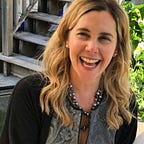An Unexpected Homecoming
“I wish it need not have happened in my time,” said Frodo. “So do I,” said Gandalf, “and so do all who live to see such times. But that is not for them to decide. All we have to decide is what to do with the time that is given us.” The Lord of the Rings, J.R.R. Tolkien
“Could you send me some extra money for the boxes and postage to ship my stuff home?” texted my son, via our primary means of long-distance communication, WhatsApp.
Yes, of course, I answered, and promptly hit send on the cash transfer, imagining it flying on digital wings into his account in New York City, where he’s lived for the past two years.
After months of such remote transfers, this would likely be the last one before he boarded a plane to return home to Vancouver, much earlier than either of us had anticipated. After emerging hale and heary on the other side of New York’s corona virus health crisis, he could not outlast its economic devastation.
My son’s time in the bright lights of New York City had started out with hope and promise in the fall of 2018. Back then he was a bright, starry-eyed student attending musical theatre school in the heart of what is arguably the pinnacle of the musical theatre universe.
We moved him and his two suitcases-worth of possessions into his shared dorm room on the Upper West Side, a tiny closet-like space painted over so many times that the door barely closed.
He was ecstatic, eager to meet new friends, learn his craft and start a new adult chapter of his life. I broke into tears while shopping for dishtowels at Bed, Bath and Beyond, our cart piled with sundries like pillows, cooking pots and a large bag of Haribo gummy bears. Such is a parent’s parting sorrow.
Our son flourished, loving the constant pulse, noise and excitement of NYC. When he graduated on February 1,2020, we were there to celebrate his achievement, arriving on an inbound plane that had traveled from Beijing to Vancouver. While Covid-19 had entered our consciousness by then, it existed on the periphery, as if hovering just off stage left.
After graduation, our son rented an apartment with school friends, succeeded in obtaining an apprenticeship visa and got a job. He was on his way.
A few short weeks later, his hopes for a future in New York changed irrevocably. The coronavirus had arrived. Life as he and we all knew it was over. The change, when it came, was a shock to every system.
Despite the concern over the explosion of the pandemic in America’s largest city, our son didn’t want to come home. He chose to stay with his American girlfriend who lived there on her own. Slowly at first, then in a flood of departures, their school friends and acquaintances abandoned New York. The city became an eerie ghost town of shuttered shops, closed tourist attractions and empty streets.
They hunkered down in her Harlem apartment and didn’t leave for nearly 3.5 months, except to read books in the spring sunshine on the tiny window stoop and stand in long, physically-distanced lines for groceries at Trader Joe’s.
The music and buzz of the city had been replaced by the incessant wail of ambulance sirens — a new urban soundtrack in a place inhabited by fear, anxiety and dread.
There is no playbook on how to navigate a pandemic as an adult, much less as a teenager far from home and living in what became one of the world’s Covid epicentres. The stress and worry were thin tethers connecting us from coast to coast, an overwhelming emotional bond of love and fear.
Coping mechanisms included re-reading Viktor Frankl’s Man’s Search for Meaning and understanding Elizabeth Kübler-Ross’ five stages of grief. The denial stage was a brief but intense period as the pandemic was clearly and most definitely happening. The profound anger and sense of injustice at having your life’s dream snuffed out before it had even begun was more difficult to navigate.
My son’s acceptance of his situation was begrudging and gradual. The universal nature of the impact and the near-complete, catastrophic closure of vast swaths of the economy, including Broadway — first shuttered until Fall 2020, then extended into who-knows-when 2021 — made resistance to life’s unfolding reality futile. In the face of a worldwide deadly viral plague, what choice did any of us have but to accept would could not be changed by any one of us alone?
Stasis is not an easy state of existence for young people. They’re ready to take on the world, to keep moving, to reach their goals. As parents, we raise our children to fly away from the nest, hopefully endowed with the tools necessary to survive and thrive without us.
When tested with the unimaginable, our son exhibited maturity and resiliency in ways that surpassed our expectations. More importantly, he realized his own capacity to endure, survive and ultimately persevere.
Despite his resiliency, despite his determination to follow his dreams, those skills alone cannot overcome a lack of opportunity, nor a lack of income. New York is struggling, and it’s impossible to live in a place where you cannot find work to pay for food or rent.
So there is acceptance. The packing and leave-taking begins. A dream is delayed.
Hopefully not forever, but for now.
Claudia Laroye is a Vancouver-based writer.
